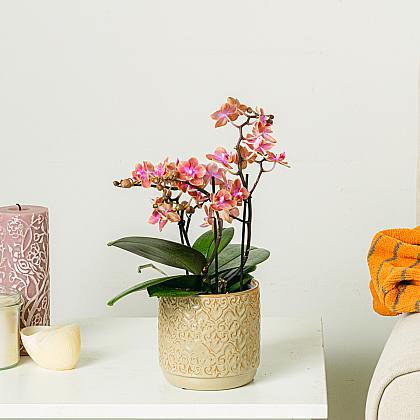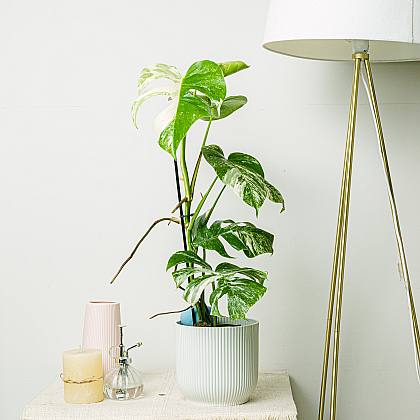Tips to ensure the survival of your orchids in winter
If you're an orchid lover and worried about their survival during the winter, you're in the right place. In this article, we will provide you with specific tips and care to ensure that your orchids survive the low temperatures and adverse conditions of this season
If you're an orchid lover and worried about their survival during the winter, you're in the right place. In this article, we will provide you with specific tips and care to ensure that your orchids survive the low temperatures and adverse conditions of this season. From preparing them properly, to protecting them from the cold and maintaining the right levels of watering and humidity, we will give you all the necessary guidelines for your orchids to bloom even in the coldest months of the year. Join us on this winter journey to ensure the health and beauty of your precious orchids!
Winterizing Your Orchids
Winterizing your orchids is an essential task to ensure their survival during the colder months of the year. One of the first things you should do is reduce the amount of water you give them. During the winter, orchids enter a dormant period and need less water. Make sure the substrate dries completely before watering them again. You may also want to consider replacing the substrate with a thicker, better-draining substrate to prevent root rot due to excess moisture. Also, you should reduce the amount of fertilizer you give them, as orchids don't grow as much during the winter and don't need as much nutrition. It's important to place your orchids in a place where they receive the right amount of indirect sunlight, but without being directly exposed to the cold. You may want to consider moving them to a warmer room or protecting them with curtains or screens to keep them from getting too cold. Also remember to maintain a good level of ventilation to avoid moisture accumulation and prevent fungal diseases. In short, winterizing your orchids involves adjusting their watering, nutrition, location, and ventilation to ensure they survive the colder months of the year and bloom in the spring.
The Importance of Watering and Humidity
The importance of watering and humidity is essential to ensure the survival of your orchids during the winter. These tropical plants require an adequate level of humidity to stay healthy and flourish. During this time of year, it is important to adjust the frequency of watering, as low temperatures and less sunlight can affect the water absorption capacity of orchids. It is advisable to water them less frequently, allowing the substrate to dry out slightly between waterings. However, it is essential to constantly monitor the humidity of the substrate to prevent it from becoming too dry or excessively wet. In addition, it is advisable to use water at room temperature to avoid sudden changes that can damage the sensitive roots of the orchids. To increase the humidity around the plants, you can place a tray of water near them or use a humidifier. It is also important to avoid using excessive heating, as this can dry out the environment and harm the health of the orchids. In summary, maintaining an adequate level of watering and humidity is crucial to ensure the well-being of your orchids during the winter.
Protecting your orchids from the cold
Protecting your orchids from the cold
During the winter, it's crucial to protect your orchids from the cold to ensure their survival. cold temperatures can severely damage these tropical plants, so it's important to take precautions. An effective way to protect them is to place them in a warm, sheltered place, such as a south-facing window or in a greenhouse. In addition, you can wrap the pots with insulating materials, such as newspapers or Styrofoam, to maintain a more stable temperature.
It is also important to avoid cold drafts that can affect the orchids. If you have windows that aren't properly sealed, consider using duct tape or silicone to keep cold air out. You can also use curtains or blinds to block any unwanted drafts.
Another fundamental aspect to protect your orchids from the cold is to control humidity. During the winter, the air tends to be drier, which can negatively affect these plants. To maintain proper humidity, you can use trays of water near the orchids or even a humidifier.
Remember that each type of orchid has different requirements, so it's important to do your research on your plant's specific needs. By following these tips and giving it proper care during the winter, you'll be able to enjoy beautiful, healthy, blooming orchids all season long.
Maintaining Proper Lighting
Maintaining proper lighting is crucial for orchid care during the winter. At this time of year, the days are shorter, and plants need an artificial light source to supplement the natural light. It's important to place orchids near a south- or west-facing window so that they receive as much natural light as possible. If this is not possible, you can use special plant lamps, which emit a light similar to that of the sun. Lamps should be placed 30 to 45 centimeters away from the orchids and lit for about 12 hours a day. It is important to remember that orchids also need a period of darkness to bloom, so it is advisable to turn off the lights at night. Additionally, it is necessary to keep in mind that each type of orchid has different light needs, so it is important to research the specifications of each plant before providing it with adequate lighting. Too much or too little light can affect the growth and development of orchids. In summary, maintaining proper lighting is essential to ensure the survival of orchids during the winter and ensure that they bloom at their best.
The Crucial Role of Ventilation
The crucial role of ventilation in the winter care of orchids is critical to ensuring their survival. During the winter, it is important to maintain adequate air circulation around the plants to avoid problems such as moisture accumulation and fungal growth. Proper ventilation helps prevent excessive condensation on leaves and roots, which can lead to the development of diseases. In addition, it promotes the exchange of gases essential for the process of photosynthesis and respiration of orchids.
To achieve good ventilation, it is recommended to place the plants in a place where there are gentle but constant air currents, avoiding strong or direct currents that can damage them. It is also beneficial to use fans or aerators to keep the air moving around the orchids. These devices help to reduce the possibility of air stagnation and promote greater evaporation of water, thus preventing the formation of conditions conducive to the development of diseases.
It is important to remember that while ventilation is essential, care should also be taken not to expose orchids to extreme cold drafts, as this can negatively affect their health. Therefore, it is recommended to find a balance between proper ventilation and protecting plants from excessive cold. Maintaining an environment with good air circulation will contribute significantly to the overall well-being of your orchids during the winter months.
Avoiding Common Winter Problems
Avoiding common winter problems, it's important to keep an eye out for certain factors that can affect the health of your orchids. One of the most common problems in this season is the appearance of fungi and diseases due to humidity and cold. To prevent this, it is necessary to maintain good ventilation and avoid overwatering the plants. Another important measure is to make sure you don't leave standing water in the saucers or pots, as this can lead to root rot. It is also advisable to avoid sudden changes in temperature and to place the orchids away from cold drafts. Another situation to avoid is the excessive use of heating, as it can dry out the environment and damage the leaves and flowers. In addition, it is important to regularly check the leaves and roots for any signs of disease or pest and treat them early. Finally, care should be taken when repotting or pruning at this time of year, as plants are more sensitive and can be more easily damaged. By following these tips, you can avoid the most common winter problems and ensure the health of your orchids throughout the season.
A final touch: extra nutrition and care
A final touch: extra nutrition and care
In addition to basic care, orchids can benefit from proper nutrition and some extra care during the winter. During this season, it is important to provide orchids with a specific fertilizer for them. This fertilizer should be rich in nutrients such as nitrogen, phosphorus and potassium, but in lower concentrations than during the rest of the year. It is recommended to dilute the fertilizer in water and apply it once a month.
In addition, it is important to pay attention to possible pests or diseases that may affect our orchids during the winter. Regularly inspecting leaves and flowers for signs of infestation, such as spots or deformations, can help us catch any problems early and take the necessary steps to combat them.
Another extra care we can give our orchids during the winter is pruning faded flowers or dry stems. This helps redirect the plant's energy towards growing new flowers and shoots.
Finally, we must not forget to maintain a clean environment around our orchids. Removing fallen leaves or remains of withered flowers prevents the accumulation of moisture and possible sources of disease.
By following these additional nutrition and extra care tips, our orchids will be prepared to face the winter and ensure their survival. Remember that each species of orchid may have specific requirements, so it's important to research the particular needs of your plants to ensure their health and beauty throughout the year.
In short, taking care of your orchids during the winter is not a difficult task if you take into account some basic tips. By preparing them for cold weather, maintaining adequate watering and humidity, protecting them from the cold, providing them with adequate lighting and ventilation, avoiding common problems, and providing them with extra nutrition, we ensure their survival. However, it is important to remember that each species of orchid has specific needs and we must research them to ensure their well-being. In addition, orchids are fascinating plants that have a lot to teach us about beauty, patience, and resilience. Perhaps by taking care of them we learn more about ourselves and our relationship with the natural world


